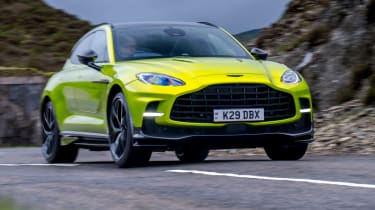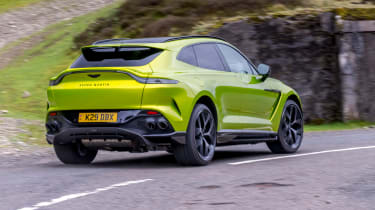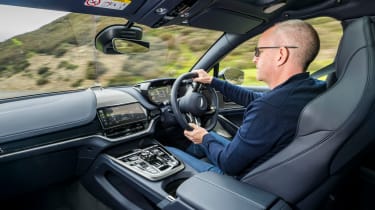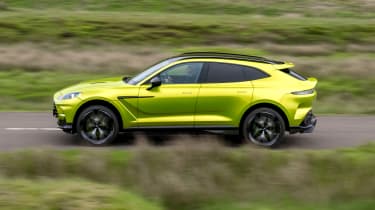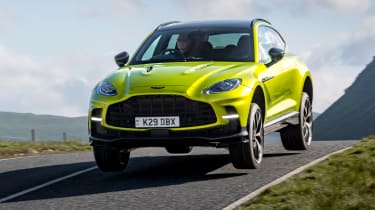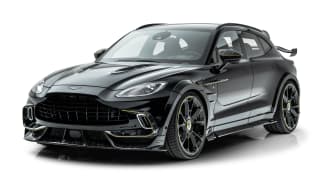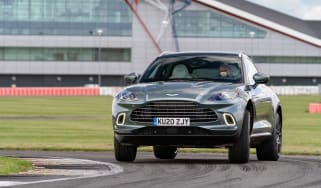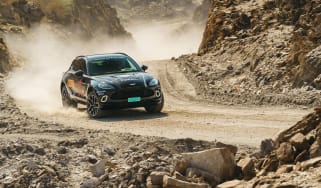Aston Martin DBX707 2024 review – still a step ahead of the pack?
A new interior gives Aston Martin’s DBX707 a much needed lift in quality and functionality. Everything else stays the same, which is a good thing
Any thoughts that the high-performance SUV was going to be a victim of the great EV switch over are pretty far off the mark. Range Rover has added an SV to its Sport line-up, Mercedes-AMG has given the G63 another significant update, Lamborghini might have added a plug to its Urus but all that means is its V8 will have 789bhp. BMW even tasked its M division to create a bespoke V8-powered SUV, the XM, but the less said about that the better.
And Aston Martin? It’s given its much needed DBX707 a mid-life nip and tuck, too. A mid-life facelift is traditionally quite a thorough affair. Baked into the product plan at conception, its introduction scheduled for when the once-fresh new car is no longer the freshest. Therefore, around its fourth anniversary come the updates. A nip here, a tuck there, possibly some more oomph somewhere. Job done, three more years of sales for before its all-new replacement arrives.
> Aston Martin DBX707 v Ferrari Purosangue – flagship super SUVs go head-to-head
These facelift cycles are also the opportunity to address any fundamental issues that were missed during several million miles of testing, only to be spotted at final sign-off and when early production had begun. Such issues are rare today, but Aston Martin knew it had one with its DBX before it saw the light of day: its interior. With the budget spent on the car’s bespoke platform, accompanying design, dynamics to give Porsche sleepless nights and a ‘new’ factory to build it in, when it came to dressing the inside of the DBX Aston Martin was shaking the last pennies from its investors’ piggy banks and was left with those small bits of fluff, a franc and a piece of Lego. Probably.
More reviews
It meant the car now charged with lifting the company from its post-IPO hangover had an interior that was, at best, functional, but in reality not as good as that. It simply wasn’t fitting for a car carrying the DBX’s price tag and competing with Range Rovers, Bentleys and other higher-end VW Group products. It’s why one of executive chairman Lawrence Stroll’s first instructions upon his arrival was to fix the interiors of the DBX and all other Astons. We saw the first of these in last year’s DB12, the next more recently in the new Vantage, and now the DBX707 benefits too (the 707 is now the only model Aston offers in its SUV lineup with the original 550 having been dropped.)
Perhaps it’s because the DBX isn’t new-new like the DB12 and Vantage that the makeover looks a far greater triumph. Where previously there were plain surfaces and scattered switchgear borrowed from Mercedes, there is now texture to the surfaces and jewellery for the controls. Those controls are also integrated rather than simply placed where they are required. There’s a blend of haptic buttons and knurled metal knobs and wheels. There’s a touchscreen with wireless Apple CarPlay with the same for Android to come via an over-the-air update. There are no more push buttons embedded in the dashboard for the gearbox controls; instead there’s a kind of gear lever on the transmission tunnel.
There’s more detail to the facia facings and the instrument cluster is a configurable TFT screen that’s integrated into the dash-top rather than simply plonked there. There’s more personalisation for trims and finishes than before, too, allowing you to create something truly bespoke. It’s a cabin worthy of its nameplate and price tag.
The HMI unit is as per the new coupes and still grates in terms of how small some of the touchscreen controls are and how fiddly they can be to operate on the move. And there is still some work to do on the radio’s willingness to find a station and stay with it.
Those familiar with a modern-day Mercedes will recognise the haptic controls on the steering wheel and, as is the case in Mercedes models, once you’ve mastered the controls and how they operate, the interactions are intuitive. After six hours in its driving seat the DBX felt totally on point in terms of its desire to be an ‘ultra luxury performance SUV’. Although after a few hours I still got a numb bum, the seat suffering from the same thin padding as Porsche’s current Cayenne.
During those six hours the updated DBX felt a larger-than-expected step up from the original. There’s detail inside its predecessor lacked, such as the brushed aluminium fitted to our example that occupies the space where those gear select buttons were, breaking up the roll of leather and providing a demarcation area between front-seat occupants. The strip of trim ahead of the passenger with its embossed ‘Aston Martin’ provides a small but much-needed piece of finishing. Details the DBX was missing from day one are present and correct.
There’s more to this update than a new interior, though. There are new door mirror housings that move as one where previously it was only the glass that adjusted, and the carbon lip on the roof spoiler is now integrated rather than bonded in position. The same Bilstein DTX dampers fitted to the DB12 and Vantage are now installed here, the steering in GT mode recalibrated to provide more assistance when you push on and the suspension control unit modified to allow the systems to interact earlier and more seamlessly. And following requests from customers, under higher torque loads and at lower engine speeds (below 4000rpm) the exhaust note is more prominent.
As a GT the DBX still covers endless motorway miles in the relaxed and responsive way it always has, providing a blend between a locked-down supersaloon and a luxury car that’s happy to breathe with the surface. On roads evo often finds itself on during eCoty and group tests it deals with the bucking, challenging topography with that inherent balance, communication and surefootedness the DBX has always portrayed. It remains the best of its type for those who enjoy driving and now it has a far nicer interior to enjoy the experience from.
Price and rivals
These ultra-high performance SUVs aren’t cheap, with the revised DBX7070 starting at £205,000 and Lamborghini's Urus SE expected to start from at least £235,000. Which almost makes Range Rover’s Sport SV good value at £171,460. At £184,595 Mercedes-AMG’s new G63 undercuts the Aston Martin to which it donates its engine.
Porsche recently revised Cayenne is eligible for consideration here, too, with the Coupe Turbo E-Hybrid starting from £144,500 and the same model but with the GT Package (carbon-ceramic brakes, more negative camber, Torque Vectoring Plus and a carbon roof) starting at £164,800.
Then, of course, there is Ferrari’s Purosangue at £312,845 which is a huge premium for a naturally aspirated V12 and a suspension system you’d expect to see on the company’s Le Mans racers, not a family SUV. Still, it’s mighty impressive as a result.
Ferrari aside, the Porsche is the most performance focussed, the Aston Martin the most striking and the one that drives most like a large supersaloon and the Sport SV is the one you’d want to spend the most time in. Most of you will probably configure an M5 Touring, or stick with your RS6. Both decisions that get our approval.

